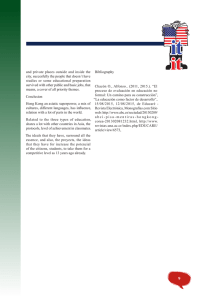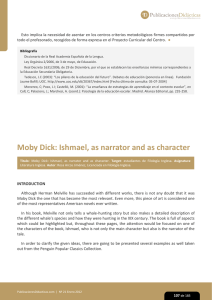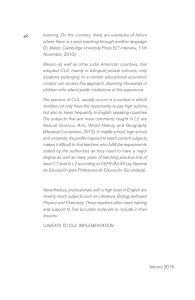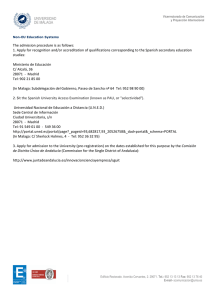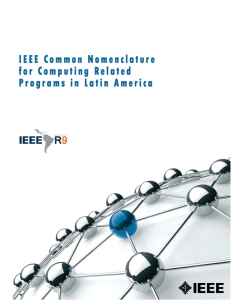Guidance in the area of socio-emotional competencies for
Anuncio
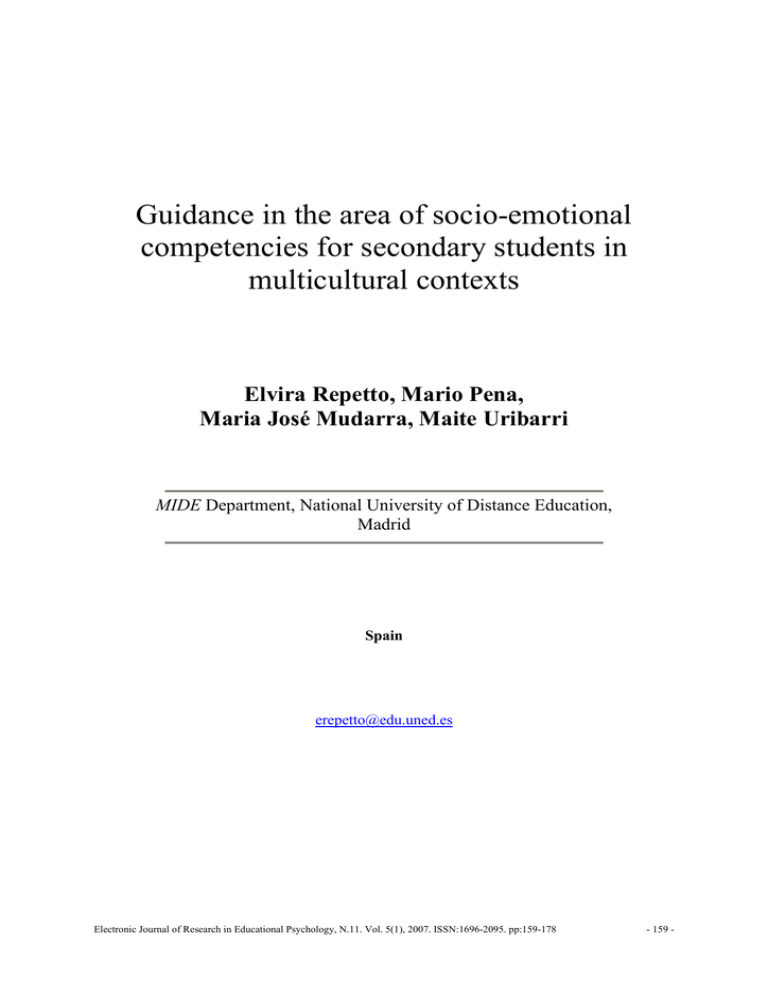
Guidance in the area of socio-emotional competencies for secondary students in multicultural contexts Elvira Repetto, Mario Pena, Maria José Mudarra, Maite Uribarri MIDE Department, National University of Distance Education, Madrid Spain [email protected] Electronic Journal of Research in Educational Psychology, N.11. Vol. 5(1), 2007. ISSN:1696-2095. pp:159-178 - 159 - E. Repetto, M. Pena, M.J. Mudarra, M. Uribarri Abstract One of the aims of Educational Guidance is social development and learning in Secondary Education students who are in multicultural contexts. An increase in socio-emotional competencies is promoted through Guidance program interventions. The Guidance Program for Socio-emotional Competencies (in Spanish, POCOSE) not only improves students’ learning process and academic performance, it also favors their integration socially and at school, thus exercising a preventive function against future school failure and other risk factors, such as absenteeism, school drop-out, or violence (bullying). The broad cultural diversity which characterizes our Educational System requires identification of socioemotional competencies that are positively related to optimal learning and better socio-educational adjustment of secondary students who are in multicultural contexts, as well as identifying existing cultural differences in the process of teaching and learning these competencies. There is also a need for scientifically-validated programs for guidance and training in socio-emotional competencies, since these are an appropriate way to improve learning and socio-educational adjustment of Secondary Education students. Keywords: counseling, socio-emotional competencies, guidance programs, multicultural contexts - 160 - Electronic Journal of Research in Educational Psychology, N.11. Vol. 5(1), 2007. ISSN:1696-2095. pp:159-178 Guidance in the area of socio-emotional competencies for secondary students in multicultural contexts Introduction Within the framework of personal Guidance over one’s life span, and specifically in the area of School Counseling, one of the main objectives is students’ social development and learning in multicultural contexts. For this purpose, improvement in socio-emotional competencies is promoted through Guidance program interventions, such as, for example, the Guidance Program for Socio-emotional Competencies (in Spanish, POCOSE). This programs forms part of the R&D Project, “Guidance and development of socio-emotional competencies through business internships”, funded by the Ministry of Education (SEJ2004-07648/EDUC), and led by Repetto (2005-2007). Guidance and intervention through socio-emotional competency programas not only improves students’ learning process and academic performance, it also favors their integration socially and at school, thus exercising a preventive function against future school failure and other risk factors, such as absenteeism, school drop-out, or violence (bullying). This article first addresses the immigration situation in Europe, specifically in Spain, as well as interventions from intercultural guidance; second, it refers to socio-emotional competencies and their educational benefits in multicultural contexts. Next, we call attention to the revelance of these competencias in the area of Career Guidance, and present national and international groups which are working in this field; we end with some final conclusions. Immigration and Intercultural Guidance The construction of a new European multicultural framework, open to growing migratory movements, as well as to responses which are unsupportive, racist and intolerant, combined with academic failure in some groups, are factors which force us to face the challenge involved in cultural pluralism and in responding to it educationally. We find ourseves with the challenge of taking on “globalization” of culture, while one’s own cultural identity is preserved and enriched. As Repetto and Pena outline (2006a), contact with diverse ethnic and other groups forces us to recognize a multiplicity of approaches, and, therefore, to develop democratic educational institutions characterized by dialog, focused on coexistence and empowerment of all students and of their cultural approach. Electronic Journal of Research in Educational Psychology, N.11. Vol. 5(1), 2007. ISSN:1696-2095. pp:159-178 - 161 - E. Repetto, M. Pena, M.J. Mudarra, M. Uribarri Likewise, immigration has become a characteristic phenomenon of our society, as shown by the ever-increasing number of foreign students in Spanish classrooms. According to the Ministry of Education (2006), in Spain, the number of foreign students in non-university education in 2005/06 course was estimated to be 529,461, some 80,000 more than the previous year, and 400,000 more than ten years before. Thus, foreign students represent 6.5% of the total of non university students. However, there are some noteworthy differences amongst Autonomous Regions: those with the highest number of foreign pupils per 1.000 students enrolled in Early Childhood, Primary or Secondary Education are La Rioja (112.5), Illes Balears (100.1), Murcia (97.2), Navarra (88) and Madrid (87.7); this data confirms the direction of the 2004/05 schoolyear, when the Autonomous Regions with highest percentages were Illes Balears (11.1%), Madrid (10.7%) and La Rioja (9.6%). Also, there are notable differences in their distribution depending on the type of school: in public schools, the number of foreign students per 1,000 is 80.6, more than the double that of private schools (32.5). Regarding their place of origin, South-American students still stand out, with 230,381 students (mainly from Ecuador and Colombia), followed by 144,508 European students (mainly from Romania) and in third position, Africa with 103,112 students (mainly from Morocco). Faced with this new scenario, Education must attend to individual socialization on one hand, by means of the reception to society’s prevailing values, and on the other hand, to the individual’s autonomy in being able to distance himself or herself from cultural conditioning factors (Repetto & Pena, 2006b). If we observe the school situation of secondary school students, some differences amongst the youth of diverse cultures are visible, with school failure rates are higher amongst the immigrant population. According to Repetto (2006a), school failure means maladjustment between the student’s actual ability and his/her academically measured school performance. Approximately 30% of these school failure cases are due to a deficit in socio-emotional competencies and 20% to lack of family and/or educational support. Indeed, Tornos and Aparicio (2005) point out that immigrant teenagers leave their studies sooner than the Spanish, and in fact, only 14.7% of immigrant offspring take the final non-compulsory stage of secondary education, less than half the percentage of Spanish students, which is approximately 37%. Differences are even greater when it comes to University: only 13% of immigrant offspring continue to this level, whereas 39% of Spanish students do proceed. Immigrants prefer the Vocational Training option: 17.4% enroll. Immigrant students also show difficulty in finishing their studies: 53% of them continue in Compulsory Secondary Education (ESO) beyond - 162 - Electronic Journal of Research in Educational Psychology, N.11. Vol. 5(1), 2007. ISSN:1696-2095. pp:159-178 Guidance in the area of socio-emotional competencies for secondary students in multicultural contexts the age of 16. If we consider the different nationalities, we can see that the number of Dominicans and Peruvians who study advanced secondary education is three times the number of Moroccans; meanwhile, the number of Moroccans studying Vocational Training is twice that of the other two groups, and they are also the group with the highest school failure rate. Therefore, it can be asserted that there is a risk situation for school failure and socioeducational maladjustment. As Repetto and Pena (2006b) indicate, Intercultural Guidance is needed in schools to promote motivation and improve learning in all students, particularly those coming from other cultures, who could have learned hopelessness experiences and erroneous beliefs that might persist during their entire adult life—for instance, thinking that the academic curriculum is irrelevant for work life. Moreover, these students usually show lack of confidence in their abilities, intensified by discriminatory treatment. On the other hand, cognitive development takes place in a specific “cultural niche” (Repetto, 2006b), so it must be assessed according to its degree of adaptation to demands of the context, such that interactions between students and their multicultural context produce changes in their cognitive development. A single cognitive development model for acquiring and using knowledge is currently being questioned (Bruner, 1980): the cultural factor prevails because of its role in the production of knowledge in a cultural setting (Sternberg, 1980). If, as Ortega indicates (1996), all multicultural education must generate dialogue, a mutual encounter and coexistence, and must encourage eradication of intolerant attitudes and behaviours characterized by the exclusion of persons because of their race or language, then it is necessary to acquire a repertory of socio-emotional competencies in order to effectively take part in such coexistence. Thus, it is not so much a matter of independent programmes to prevent violence, school drop-out or other risk factors, but holistic, coordinated programmes that stimulate social and emotional learning, and influence variables responsible for academic success—in a broad sense, positive attitudes, behaviour and school marks (Zins et al., 2004)—such as motivation, self-regulation and emotional self-knowledge. Therefore, Intercultural Guidance can improve these negative factors through demonstrating the relevance of formal learning for work life; through clarifying relationships between education and the achievement of professional objectives; through the perception of educational objectives made available to them; through empowerment of the self, and through overcoming stereotypes related to ethnic groups, gender, social status or culture. Particularly, Intercultural Guidance Programmes for personal and social development are characterized by, amongst other aspects, development of self-esteem, involvement in meaningful activities and Electronic Journal of Research in Educational Psychology, N.11. Vol. 5(1), 2007. ISSN:1696-2095. pp:159-178 - 163 - E. Repetto, M. Pena, M.J. Mudarra, M. Uribarri reducing the risk of social exclusion (Repetto & Pena, 2006a). Taking into account that Intercultural Guidance in school contexts intends to strengthen self-esteem, positive self-concept and the development of interpersonal relationships and mutual respect, that is, the students’ personal and social development, then one of the most pertinent ways to intervene is the competency-related approach, and in particular, focusing on socio-emotional competencies (Repetto & Pérez-González, in press). Socio-emotional competencies and their educational benefits in multicultural contexts At the international level, interest in developing competencies in academic settings has risen, as is seen in the Tuning project Educational Structures in Europe (2003), whose aim is university students’ training in generic and specific competencies. Socio-emotional competencies stand out amongst the former. As Weissberg and Greenberg (1998) and CASEL (2003) point out, these competencies are specially relevant in the educational setting. However, the cultural factor has not received much research attention from the point of view of its incidence in the level of socio-emotional competencies. At school one observes both the need and the possibility of socializing foreign students, at the same time favouring all students’ scholastic learning. One intervention strategy is found in the Programme for Tolerance and Prevention of Violence in Youth (Díaz-Aguado, 1996) or the campaign Coexisting is Living (MEC, 1997), an inititiative led by the Autonomous Region of Madrid. The latter is focused on teenagers and young people from 12 to 18 years, with the aim of preventing violence at schools and promoting education for coexistence. Beyond academic intelligence, the development of socio-emotional competencies makes it possible to tackle the problem of school failure as a socio-personal condition that is shown in the incapacity of the individual to reach educational objectives proposed by a System or a School, at a certain curriculum level (Garcia, 2003). A literature analysis confirms some of the reasons that justify intervention in terms of socio-emotional competencies (Pena & Repetto, 2006). Among contributions from abroad, Goleman (1996) stands out for being widely known. On the basis of some American studies, he notes the low level of emotional competence in young people of this decade, characterized by what he calls “emotional illiteracy”. Some other authors agree (Graczyk, Weissberg, Payton, Elias, Greenberg & Zins (2000), quoting Dryfoos (1997), Scales & Leffert (1999)), - 164 - Electronic Journal of Research in Educational Psychology, N.11. Vol. 5(1), 2007. ISSN:1696-2095. pp:159-178 Guidance in the area of socio-emotional competencies for secondary students in multicultural contexts who call for attention to maladjusted behaviours shown by young people, such as aggressive behaviours and fights, weapons possession, drug and alcohol use, maladjusted sexual behaviours or suicidal attempts. In this sense, Steiner (1998) states that when we are educated emotionally we can manage difficult emotional situations—situations which otherwise would lead to rows, anger or offensive responses. In Spain, some authors have outlined the importance of emotional education as a preventive measure to minimize vulnerability to dysfunctions and to prevent their occurrence (Ibarrola, 2004; Bisquerra, 2000). On the other hand, Fernández Berrocal and Extremera (2002) tackle the question of the intellectual quotient as a bad predictor for life success, since academic intelligence is not enough for achieving professional success, nor does it guarantee satisfaction in personal relationships. All this, together with a set of social situations, makes socio-emotional intervention in the educational setting necessary (Álvarez, 2001). The role of socio-emotional competencies as a predictor of the “school performance” variable and as a factor for learning improvement has been commented in several national and international studies (Extremera & Fernández Berrocal, 2004). According to Schutte, Malouff, Hall et al. (1998), scores on tools which measure socio-emotional competencies significantly predict university students’ average mark at the end of the academic year; likewise, Parker, Summerfeldt, Hogan and Majeski (2004) used the variable “socio-emotional competencies” as a predictor of students who were going to be included in the groups of high and low academic performance. According to this study, in general terms, socio-emotional competencies identify the first-year students who have academic success at the end of the semester; specifically, 82% of students with high academic performance and 91% of students with low academic performance were correctly identified and grouped depending on their scores in the socio-emotional competency variables. In our country, Fernández-Berrocal, Extremera and Ramos (2004) study the mediating effect that good mental health exerts on average school performance: taken as a whole, results of this research show that those students with more highly developed socio-emotional competencies show better psychological balance, which in turn is related to and influences academic performance. In this sense, results indicate that in teenagers with learning disabilities, socio-emotional competencies can act to moderate the effects of cognitive abilities on academic performance (Petrides, Frederickson & Furnham, 2004). Nevertheless, as Zins et al (2004) state, the influence of socio-emotional learning on academic achievement depends on diverse factors such as how this achievement is defined and assessed; the environment in which learning experiences take place--more or less tradiElectronic Journal of Research in Educational Psychology, N.11. Vol. 5(1), 2007. ISSN:1696-2095. pp:159-178 - 165 - E. Repetto, M. Pena, M.J. Mudarra, M. Uribarri tional or motivating--the degree to which programmes are specifically contextualized as a function of the school, or are linked to their peers or adult reference figures. All this must be taken into account Therefore, there seems to be sufficient scientific basis to endorse the relationships between socio-emotional learning and “academic success” and, ultimately, with life success (Zins, Weissberg, Wang & Walberg, 204). Pro-social behaviour in the classroom also is significantly related to positive intellectual and academic results (DiPerna & Elliot, 1999; Haynes, Ben-Avie & Ensign, 2003; Malecky & Elliot, 2002; Pasi, 2001). Conversely, antisocial behaviour often manifest by low performing students is also widely documented (Hawkins, Farrington & Catalano, 1998), so that this type of intervention becomes particularly effective in young people of mid-to-lower class, more prone to be involved in violent activities, use of alcohol, and sexual activities leading to unwanted pregnancies. For all these reasons, there is a need to promote school psychology interventions to develop such competencies throughout life, interventions focused on the designing and implementating emotional education programmes, ideally accompanied by other strategies such as the teaching of socio-emotional competencies in the curriculum (Zeiner, Roberts & Matthews, 2002). In fact, 34% of programmes reviewed include methods for promoting integration of socio-emotional competencies into the school curriculum and in teaching strategies in all areas (Zins, Weissberg, Wang & Walberg, 2004). By applying these programmes, students not only enrich their emotional vocabulary, but also learn to use coping strategies in emotionally difficult situations, attaining emotional self-control, so that they can adequately manage emotions and conflictive impulses (Vallés & Vallés, 2000). These self-regulating strategies are very useful in school contexts, when, for instance, academic tasks are being undertaken, and are also effective in non-school contexts, whether family or social (Torres, 1996); we see the transfer of socio-emotional competencies, usually associated with emotional intelligence, from the academic setting to other settings such as the personal and social. Finally, other educational benefits of this type of intervention, and of socio-emotional competences in general, consist of preventing risk factors in the classroom, reducing the number of classroom expulsions and the rate of aggressions, and improving academic marks and school performance (CASEL, 2003), levels of well-being and psychological adjustment, and satisfaction in students’ interpersonal relationships (Extremera & Fernández-Berrocal, 2004). - 166 - Electronic Journal of Research in Educational Psychology, N.11. Vol. 5(1), 2007. ISSN:1696-2095. pp:159-178 Guidance in the area of socio-emotional competencies for secondary students in multicultural contexts 2004). Thus, opportunities increase for these students to take part in pro-social activities and to gain affective rewards for their participation. Relevance of socio-emotional competencies in Career Contexts: a challenge for Career Guidance Modern societies demand professionals with a wide range of competencies. Among these, some stand out more and more: those not exclusively related to the tasks inherent to a job, but referring to how one works, attitude towards work and towards others, quality of human relations, flexibility or ability to adapt. Beyond knowledge and know how, other requirements are wanting to do, knowing how to be, and knowing how to behave, considering axiological aspects that are implicit in how we perceive and live with others in a social context. As a matter of fact, these types of socio-emotional competencies are proven to facilitate labour placement of university students, and, in general, they can be considered to promote employability (Hettich, 2000; Caruso & Wolfe, 2001). In organizational contexts, socio-emotional competencies, together with cognitive abilities, are increasingly considered relevant to achieving high performance and optimal professional development (Izquierdo, 2001). As Dulewicz and Higgs (1999) evaluated, development of socio-emotional competencies plays an important role in strengthening the individual success in an organizational context. The need for these types of competencies covers a large range of tasks, from leading groups, to team work, work stress tolerance, negotiating and conflict solving, one’s own professional career planning, motivation toward work and toward others, or addressing critical situations. However, in addition to individual success, it is essential to know how to work in team, to cooperate, to coordinate with others: in summary, to put socio-emotional competencies into practice to facilitate and improve team work and quality of relationships (Shutte et al. 2001; Charbonneau & Nicol, 2002). Among reciprocal interactions between the individual and his/her work setting (characteristics of current professional experience), we highlight the reciprocal influence among demands of the individual, the company environment and work effectiveness. These demonstrate the direct relationship between environment, culture, the organizational system and effectiveness in such areas as recruiting, teamwork, the employee’s moral commitment and health, innovation, productivity, efficiency, sales and incomes levels, service quality and cusElectronic Journal of Research in Educational Psychology, N.11. Vol. 5(1), 2007. ISSN:1696-2095. pp:159-178 - 167 - E. Repetto, M. Pena, M.J. Mudarra, M. Uribarri tomer loyalty (Boyatzis et al. 2000; Chermiss & Goleman, 2001). Thus, important relationships between socio-emotional competencies and career development (Repetto & Pérez, in press; Caruso & Wolfe, 2001), work performance (Bachman et al. 2000) and effective leadership (Segal, 2002) become evident. Socio-emotional competencies also have influence in the individual’s process of adapting to the work environment –managing stress and occupational pressure. These are considered basic criteria for predicting work behaviour and occupational success (Bar-On et al, 2000; Wong & Law, 2002). Such aspects are particularly important in multicultural contexts where the lack or shortage of these types of competencies becomes a risk factor in professional placement and development processes, further aggravating even more the risk of social exclusion. Consequently, both initial placement as well as diverse professional transitions require proposals for Guidance programs aimed at developing socio-emotional competencies which can address the effects of unstable work, unemployment, professional mobility requirements, and the interwoven complexity of sociolabour relationships and quality of life at work. One of the most relevant Career Guidance programs in this area is the Guidance Program for Socio-emotional Competencies (in Spanish, POCOSE). This program forms part of the R&D Project, “Guidance and development of socio-emotional competencies through business internships”, funded by the Ministry of Education (SEJ2004-07648/EDUC), and led by Repetto (2005-2007). The main objective of the POCOSE Program is guidance and training in socioemotional competencies, to be applied within the framework of the Practicum or Business Internship, thus encouraging personal development and labour placement for the student and recent graduate. It is made up of seven modules, each of which develops one of the following competencies: emotional self-awareness, empathy, emotional control, motivation, assertiveness, teamwork and conflict resolution; each module specifies its objectives, content, dynamic, sequence of sessions, materials used and most pertinent bibliography. Likewise, the modules include a teacher’s manual which offers a general introduction to the module, as well as a didactic guide which explains how each session is carried out, along with visual aids, audiovisuals, computer-based aids and a series of documents required for implementation; it also - 168 - Electronic Journal of Research in Educational Psychology, N.11. Vol. 5(1), 2007. ISSN:1696-2095. pp:159-178 Guidance in the area of socio-emotional competencies for secondary students in multicultural contexts contains a document listing what work materials the student needs to complete each session. Regarding scientific validation of the program, a socioemotional competency inventory (ICOSE, pending publication) is applied as both a pre and post test measurement, with two questionnaires for evaluating the importance of these competencies in students at school or university, as well as the to what extent these competences are present in the respective educational stages (Repetto, Beltrán, Garay-Gordovil & Pena, 2006). Through this program, and others that may emerge from future research, Career Guidance will meet the challenge of becoming a genuine social resource for addressing the multiple occupational choices and decisions which each individual must face over the course of life. Developing socioemotional competencies development in national and international groups In our country, research about socio-emotional competency programmes is recent. However, we can point to the line of research led by Dr. Repetto (UNED Faculty of Education), on one hand, via the R&D Project, “Guidance and development of socio-emotional competencies through career training and at University (SEJ2004-07648/EDUC, 2005-2007), subsidized by the Spanish Ministry of Education, and on the other hand, through leading the Centre on Research in Competency-based Guidance for Professional Placement and Inclusion (2004). Other national, European and international projects included in this line of research are: the European Accreditation Scheme for Career Guidance Practitioners (Leonardo da Vinci Program, 2006); The International Counsellor Qualification Standards (International Association for Educational and Vocational Guidance and UNED Vice-Rectory of Research 2000-2004); New Skills for a New Future: Higher Education Guidance and Counselling Services in the European Union (Leonardo da Vinci. European Commission, 1998-1999) and the development of a European Training Programme for Staff in Educational and Vocational Guidance following the Competency Based Approach (Task Force, Human Resources, Education, Training and Youth. Commission of the European Community; Agreement nr. 91-211-ptx-164, 1991-1998). This course of research which addresses the topic of this project offers guarantees for both process rigor and for reliability of outcomes that can be drawn from the present research. Electronic Journal of Research in Educational Psychology, N.11. Vol. 5(1), 2007. ISSN:1696-2095. pp:159-178 - 169 - E. Repetto, M. Pena, M.J. Mudarra, M. Uribarri Amongst national groups that have researched socio-emotional competencies, we find the group directed by Guil (2006), whose research project is framed in the field of Psychology, focusing on the psychological analysis of the emotional intelligence construct and of alternatives for measuring it. Our proposal is also rooted in Pedagogy, because its aim is to elaborate a training program in socio-emotional competences in order to cover an existing need in our schools. Also notable are studies by Pascual and Cuadrado (2001), Vallés (1999), Vallés and Vallés (2003), Güell, Barceló and Muñoz (2000, 2003) and work developed by the GROP in Barcelona (Álvarez et al, 2001). Other research considers different factors amongst which social and emotional competencies are included, such as those of Garaigordobil (2005), Aron & Milicic (1996), De la Cruz and Mazaira (1997), Traveset (1999), Blasco, Bueno Navarro and Torregrosa (2002), Espejo, García-Salmones and Vicente (2000), Salvador (2000), Salmurri and Blanxer (2002), Ibarrola & Delfo (2003a, 2003b), Renom (2003) and López Cassá (2003). However, when revising the variables studied, and the different programmes and intervention and assessment tools in our country, we notice that they focus on developing basically the same knowledge and skills with only slight differences, and few of them are applied scientifically. Reliable experimental and psychometric designs are seldom used, and theories which support the intervention, or its intended educational and socio-cultural context, are not specified. All this leads to confusion when it comes to effectively evaluating achievements attained (Zeidner, Roberts & Matthews, 2002). Nevertheless, we must mention studies by GROUP (Bisquerra, 2004), since they have initiated an evaluation process of these projects. Results are not yet available in the literature. For all these reasons we highly advocate rigorous research in evaluating programmes and training tools for socio-emotional competencies (Bisquerra, 2004: Filella, Ribes, Agulló & Soldevilla, 2002), such as we have pursued in this project which addresses a specific priority context, the current multicultural context of our schools. At the international level, a new approach to competencies comes into focus (Boyatzis, 1982; Levy-Leboyer, 1997; Tejada, 1999; Pereda & Berrocal, 1999, 2001; García, 2000, 2003), adopted in European policies regarding Education and Training (Tuning, 2003). Special attention is warranted by the professional community of researchers and educational practitioners called “The Collaborative for Academic, Social and Emotional Learning” (CASEL), founded in the USA by Goleman and Rockefeller Growald in 1994, and whose field of study centres on teaching and learning socio-emotional competencies. This group tries to create a solid theoretical body of knowledge, verified in practice, and extended through socioemotional competency-based training programmes for professionals (Graczyk et al., 2000). - 170 - Electronic Journal of Research in Educational Psychology, N.11. Vol. 5(1), 2007. ISSN:1696-2095. pp:159-178 Guidance in the area of socio-emotional competencies for secondary students in multicultural contexts Amongst their priorities we find the revision and evaluation of more than 250 programmes for stimulating social and emotional learning (CASEL, 2003). Within the specific field of intercultural guidance, the founding of the Association for Multicultural Counseling and Development (1985), become another milestone, such that today multiculturality constitutes the fourth dimension of Guidance (complementary to psychodynamic, behavioural and humanistic approaches), given that every kind of help takes place in a cultural context. However, research about multiculturality usually refers more to education than to guidance. There are very diverse research groups about education in multicultural contexts, both at the international and national levels, from the European Society for Intercultural Education, Training and Research (SIETAR), that intends to develop and apply knowledge, skills and values to allow for adequate relationships between different cultures, ethnic groups, organizations and levels (www.sietar-europa.org); the laboratory of intercultural studies at the University of Granada; the Inter group of UNED, which investigates, amongst other aspects, the development of inter-cultural competencies of guidance practitioners and teachers, or the research Network of the Resource Centre for Attention to Cultural Diversity in Education (CREADERED) , from the Ministry of Education, with a specific section dedicated to interculturality. Conclusions Due to the growth of migratory movements, as well as unsupportive, racist responses, together with academic failure in certain groups, it is essential that the entire educational community become involved in the challenge posed by cultural pluralism and its corresponding educational responses. In the field of Guidance, we must comment that, in spite of the programmes mentioned for intervening in socio-emotional competences, it is difficult to find studies published about their evaluation or effectiveness, or empirical research on training programmes in socioemotional competencies for multicultural contexts. Thus it seemed appropriate to follow Dr. Repetto’s line of research (2005-2007), creating a programme in these contexts. In addition to the impact in the educational field, this programme could have international projection through scientific exchanges with other research groups, through articles in specialized journals, presentations at conferences, and so on. Electronic Journal of Research in Educational Psychology, N.11. Vol. 5(1), 2007. ISSN:1696-2095. pp:159-178 - 171 - E. Repetto, M. Pena, M.J. Mudarra, M. Uribarri Therefore, the following efforts are recommended: (1) an up-to-date revision of the state of the question of socioemotional competencies which encourage improved learning and integration of secondary students in multicultural contexts at school and socially, and (2) the design, validation, application and evaluation of a counseling intervention program aimed at developing these competences in secondary students in multicultural contexts. Finally, we underscore that both placement processes as well as diverse career transitions demand options in Guidance programs, such as the POCOSE, which seek to develop socioemotional competencies capable of addressing the effects of unstable labour, unemployment, career mobility demands, and the interwoven complex of sociolabour relationships and quality of life at work. This way, Career Guidance will meet the challenge of becoming a genuine social resource for addressing the multiple occupational choices and decisions faced by each individual over his or her lifetime. References Álvarez, M. (2001). Diseño y evaluación de programas de educación emocional. [Design and evaluation of emotional education programs.] Barcelona, Ciss-Praxis. Arón, A.M., Milicia, N. (1996). Vivir con otros. [Living with others.] Madrid, CEPE. Bachman, J., Stein, S., Campbell, K. & Sitarenios, G. (2000). Emotional intelligence in the Collection of Debt. International Journal of Selection and Assessment, 8 (3), 176182). Bar-On, R., Brown, J.M., Kirkcaldy, B.D. & Thomé, E.P. (2000): Emotional expression and implications for occupational stress, an application of the Emotional Quotient Inventory (EQ-i). Personality and Individual Differences, 28, 1107-1118 (2000). Bisquerra, R. (2000). Educación emocional y bienestar. [Emocional education and wellbeing.] Barcelona, Praxis. Bisquerra, R. (2004). Diseño, aplicación y evaluación de programas de educación emocional. [Design, application and evaluation of emotional education programs.] In M.J. Iglesias (ed): El reto de la educación emocional en nuestra sociedad, 121-161. A Coruña, Universidade da Coruña Blasco, J.L., Bueno, V., Navarro, R., & Torregrosa, D. (2002). Programa de educación emocional. Propuestas para la tutoría. [An emotional education program. Proposals for homeroom.] Valencia, Consejería de Cultura y Educación de la Generalitat valenciana. - 172 - Electronic Journal of Research in Educational Psychology, N.11. Vol. 5(1), 2007. ISSN:1696-2095. pp:159-178 Guidance in the area of socio-emotional competencies for secondary students in multicultural contexts Boyatzis, R. E. (1982). The competent manager: A model for effective performance. New York: John Wiley & Sons. Boyatzis, R.E., Goleman, D. & Rhee, K.S. (2000). Clustering competence in Emotional Intelligence. In Bar-On, R. & Parker, J.D. (Eds.), The competent manager: a model for effective performance. New York: Willey & Sons. Caruso, D.R. & Wolfe, Ch. J. (2001). Emotional intelligence in the workplace. In J. Ciarrochi, J. Forgas & J.D. Mayer (Eds), Emotional intelligence in everyday life. London: Psychology Press. Charbonneau, D. & Nicol, A.A.M. (2002): Emotional intelligence and prosocial behaviors in adolescents. Psychological Reports, vol. 90, 2, 361-370, April 2002. (SummaryAbstract). Chermiss, C. & Goleman, D. (2001). The emotionally intelligent workplace. San Francisco: Jossey-Bass. Collaborative for Academic, Social and Emotional Learning (2003). Safe and sound: An educational leader’s guide to evidence-based social and emotional learning programs. Chicago: Author. De La Cruz & Mazaira (1997). Programa de Desarrollo afectivo. DSA. [Affective Development Program. DSA.] Madrid. TEA Ediciones. Díaz-Aguado, M.J. (1996). Programas de educación para la tolerancia y prevención de la violencia en los jóvenes. Cuatro volúmenes y dos vídeos. [Educational programs for tolerance and prevention of violence in young people. Four volumen and two videos.] Madrid: Instituto de la Juventud, Ministerio de Trabajo y Asuntos Sociales. DiPerna, J.C. & Elliot, S.N. (1999). The development and validation of the academic competence evaluation scales. Journal of Psychoeducational Assessment, 17, 207-225. Dryfoos, J.G. (1997). The prevalence of problem behaviors: Implications for programs. In R.P. Weissberg, T.P. Gullota, R.L. Hampton, B.A. Ryan, & G.R. Adams (Eds). Healthy children 2010: Enhancing children’s wellness, 17-46. Thousand Oaks, CA: Sage Publications. Dulewicz, V. & Higgs, M.J. (1999). Can emotional intelligence be measured and developed? Leadership & Organization Development Journal, 20 (5), 242-252. Espejo, García-Salmones & Vicente (2000). El programa para el Desarrollo y Mejora de la Inteligencia Emocional. [The program for Development and Improvement of Emotional Intelligence.] Madrid. Electronic Journal of Research in Educational Psychology, N.11. Vol. 5(1), 2007. ISSN:1696-2095. pp:159-178 - 173 - E. Repetto, M. Pena, M.J. Mudarra, M. Uribarri Extremera, N. & Fernández-Berrocal, P. (2004). El papel de la inteligencia emocional en el alumnado: evidencias empíricas. [The role of emotional intelligence in students: empirical evidence.] Revista Electrónica de Investigación Educativa, 6(2) Fernández-Berrocal, P. & Extremera, N. (2002). La inteligencia emocional como una habilidad esencial en la escuela. [Emotional intelligence as an essential skill at school], Revista Iberoamericana de Educación, 29, 1-6. Fernández-Berrocal, P., Extremera, N. & Ramos, N. (2004). Validity and reability of the Spanish modified version of the trait meta-mood scale, Psychological Reports, 94, 751-755. Filella, G., Ribes, R., Agulló, M.J. & Soldevilla, A. (2002). Formación del profesorado: asesoramiento sobre educación emocional en centros escolares de infantil y primaria. [Training training: advising in emotional education at early education and primary schools.] Educar, 30, 159-167. Garaigordobil, M. (2005). Diseño y evaluación de un programa de intervención socioemocional para promover la conducta prosocial y prevenir la violencia. [Design and evaluation of a socioemotional intervention program for prosocial behavior and violence prevention.] Madrid: Centro de Publicaciones del Ministerio de Educación y Ciencia. Colección Investigación Nº 160 (First Prize for National Educational Research 2003). García, M. (2000). Factores clave en el desarrollo de competencias. [Key factors in developing competencies.] In Aguilló, E., Remeseiro, C. & Fernández, A.: Psicología del Trabajo, de las Organizaciones y de los Recursos Humanos. Madrid: Biblioteca Nueva. García, M. (2003). Entrenamiento en competencias. [Competency training.] Encuentros en Psicología Social, 1 (3), 27-32. Goleman, D. (1996). Inteligencia Emocional. [Emocional Intelligence.] Barcelona, Kairos. Graczyk, P.A., Weissberg, R.P., Payton, J.W., Elias, M.J., Greenberg, M.T. & Zins, J.E. (2000). Criteria for Evaluating the Quality of School-Based Social and Emotional Learning Programs. In R. Bar-On & J.D.A. Parker, The Handbook of Emotional Intelligence. Theory, Development, Assessment, and Application at Home, School, and in the Workplace, 391-410. San Francisco, Ca: Jossey-Bass. Güell Barceló, M. & Muñoz Redón, J. (2000). Desconócete a ti mismo. Programa de alfabetización emocional. [Not recognizing yourself. A program for emotional literacy.] Barcelona, Paidos. - 174 - Electronic Journal of Research in Educational Psychology, N.11. Vol. 5(1), 2007. ISSN:1696-2095. pp:159-178 Guidance in the area of socio-emotional competencies for secondary students in multicultural contexts Güell Barceló, M. & Muñoz Redón, J. (2003). Educación emocional. Programa para la educación secundaria post-obligatoria. [Emotional education. A program for postcompulsory secondary education.] Barcelona, Praxis. Guil, R. (2006). Adaptación socioescolar en contextos multiculturales: inteligencia emocional y estrategias de aculturación exitosas. [Social and school adaptation in multicultural contexts: emotional intelligence and successful acculturation strategies.] R&D Project subsidized by the Ministry of Education & Cultura for the 2007-2009 period. Hawkins, J.D., Farrington, D.P. & Catalano, R.F. (1998). Reducing violence through the schools. In D.S. Eliot, B.A. Hamburg & K.R. Williams (Eds.), Violence in American schools: a new perspective, 188-216. Cambridge: Cambridge University Press. Haynes, N.M., Ben-Avie, M. & Ensign, J. (2003). How social and emotional development add up: getting results in math and science education. New York: Teachers College Press. Hettich, P. (2000). Transition processes from college to career. Washington: APA. Ibarrola, B. (2004). La educación de la inteligencia emocional. [Education in Emotional Intelligence] Proceedings from the IX technical conference: Other Ways to Educate. Madrid. Ibarrola, B. & Delfo, E (2003a). Sentir y pensar. Programa de Inteligencia emocional para niños de 3 a 5 años. [Feeling and thinking. An emotional intelligence program for children from 3-5 years of age.] Madrid: SM Ibarrola, B. & Delfo, E (2003b). Sentir y pensar. Programa de Inteligencia emocional para niños de 6 a 8 años. [Feeling and thinking. An emotional intelligence program for children from 6-8 years of age.] Madrid: SM Izquierdo, C. (2001). Comunicación grupal y desarrollo personal: las emociones en el punto de mira de la inteligencia y el aprendizaje organizacional. [Group communication and personal development: a look at emotions in intelligence and organizational learning.] In Del Rincón, B. (Coord.), Presente y futuro del trabajo psicopedagógico. Madrid: Ariel Educación. Levy-Leboyer, C. (1997). Gestión de las competencias: cómo analizarlas, cómo evaluarlas, cómo desarrollarlas. [Competency management: how to analyze them, how to evaluate them, how to develop them.] Barcelona: Gestión 2000. López Cassà, E. (2003). Educación emocional. Programa para 3-6 años. [Emotional education. A program for 3-6 year olds.] Barcelona, Praxis. Electronic Journal of Research in Educational Psychology, N.11. Vol. 5(1), 2007. ISSN:1696-2095. pp:159-178 - 175 - E. Repetto, M. Pena, M.J. Mudarra, M. Uribarri Malecki, C.K. & Elliott, S.N. (2002). Children’s social behaviours as predictors of academic achievement: a longitudinal analysis. School Psychology Quarterly, 17 (1), 1-23. Ministerio de Educación y Ciencia (1997). Convivir es vivir. Programa de desarrollo de la convivencia en centros educativos de la Comunidad de Madrid. [Coexisting is living. A program for development coexistence at schools in the Madrid Region.] Madrid: Defensor del Menor en la Comunidad de Madrid. Ortega, J.A. (1996). Educación Multicultural para la Tolerancia y la Paz. Fundamentos y estrategias didácticas. [Multicultural Education for Tolerante and Peace. Foundations and didactic strategies.] Granada: Grupo Editorial Universitario Parker, J. D. A., Summerfeldt, L. J., Hogan, M. J. & Majeski, S. A. (2004). Emotional intelligence and academic success: examining the transition from high school to university. Personality and Individual Differences, 36 (1), 163-172. Pascual, V. & Cuadrado, M. (2001). Educación emocional. Programa de actividades para E.S.O. [Emotional education. A program of activities for compulsory secondary education.] Barcelona, CissPraxis. Pasi, R.J. (2001). Higher expectations: promoting social emotional learning and academic achievement in your school. New York: Teachers College Press. Pena, E. & Repetto, E. (2006). Propuestas educativas para el desarrollo de la inteligencia emocional. [Educational proposals for developing emotional intelligence.] Revista de Educación (pendiente de publicación). Pereda, S. & Berrocal, F. (1999). Gestión de Recursos Humanos por Competencias. [Human Resource Management through Competencies.] Madrid: Editorial Centro de Estudios Ramón Areces. Pereda, S. & Berrocal, F. (2001). Técnicas de gestión de recursos humanos por competencias. [Techniques for managing human resources through competencies.] Madrid: Editorial Centro de Estudios Ramón Areces. Petrides, K.V., Frederickson, N., & Furnham, A. (2004). The role of trait emotional intelligence in academic performance and deviant behavior at school. Personality and Individual Differences, 36, 277-293. Renom, A. (2003). Educación emocional. Programa para la educación primaria. [Emotional education. A program for primary education.] Barcelona, Praxis. Repetto, E. (2005). Proyecto I+D: “Orientación y desarrollo de competencias socioemocionales a través de las prácticas en empresa”. [R&D Project: Guidance and de- - 176 - Electronic Journal of Research in Educational Psychology, N.11. Vol. 5(1), 2007. ISSN:1696-2095. pp:159-178 Guidance in the area of socio-emotional competencies for secondary students in multicultural contexts velopment of socioemotional competiences through business internships.” Sponsored by the Ministry of Education, SEJ2004-07648/EDUC. Repetto, E. (2006a). Las competencias socioemocionales y el fracaso escolar. [Socioemotional competencies and school failure.] Lectura given at the 1st Workshop Pozuelo Alarcón, Madrid Repetto, E. (2006b). Orientación intercultural e inclusión social. [Intercultural guidance and social inclusión.] Proceedings from the International Conference on Guidance, Social Inclusión and Career Development, 41-53. Repetto, E., Beltrán, S, Garay-Gordovil, A. & Pena, M. (2006). Validación del Inventario de competencias socioemocionales –importancia y presencia- (ICS-I; ICS-P) en estudiantes de ciclos formativos y de Universidad. [Validation of the Sociemotional Competency Inventory—presence and importance—in students at school and university.] Revista Española de Orientación y Psicopedagogía 17 (2), 213-223. Repetto, E. & Pérez-González, J.C. (in press). Formación en competencias socioemocionales a través de las prácticas en empresas. [Training in socioemotional competencies through business internships.] Revista Europea de Formación Profesional-European Journal of Vocational Training, 40 (January-April 2007/I). Monograph on competencies. Repetto, E. & Pena, M. (2006a). Orientación intercultural, respuesta al fenómeno de la inmigración. [Intercultural guidance, a response to the immigration phenomenon.] Publication pending. Repetto, E. & Pena, M. (2006b). Cross-cultural counselling and social inclusion in Spain, Paradigma, vol. 27, 2. Salmurri, F. & Blanxer, N. (2002). Programa para la educación emocional en la escuela. [A program for emotional education at school.] In R. Bisquerra, La práctica de la orientación y la tutoría, 145-179. Barcelona, Praxis. Salvador, M. (2000). Programa de desarrollo emocional. [A program for emotional development.] Málaga, Aljibe. Scales, P.C. & Leffert, N. (1999). Developmental assets: A synthesis of the scientific research on adolescent development. Minneapolis, Search Institute. Schutte, N.S., Malouff, J. M., Bobik, Ch., Coston, T. D., Greeson, C., Jedlicka, Ch., Rhodes, E. & Wendorf, G. (2001). Emotional Intelligence and Interpersonal Relations. The Journal of Social Psychology, 141 (4), 523-536. Electronic Journal of Research in Educational Psychology, N.11. Vol. 5(1), 2007. ISSN:1696-2095. pp:159-178 - 177 - E. Repetto, M. Pena, M.J. Mudarra, M. Uribarri Segal, J. (2002). Good leaders use “emotional intelligence”. Emotionally intelligent leadership is a skill that can be learned and taught throughout life. Health Progress, 83 (3), 44-46). Steiner, C. (1998). La educación emocional. [Emotional education.] Buenos Aires, Avon Books. Tejada, J. (1999). Acerca de las competencias profesionales. [Regarding professional competencies.] Herramientas, 56, 20-30. Tornos, A & Aparicio, R. (2005). Las redes sociales de los inmigrantes en España: un estudio sobre el terreno. [Social networks of immigrants in Spain: the lay of the land.] Madrid. Ministerio de Trabajo y Asuntos Sociales. Asuntos Sociales. Torres, J.C. (1996). Estrategias de aprendizaje: la tercera vía. [Learning strategies: the third way.] Comunidad educativa, 230, 5-8 (center notebook). Traveset, M. (1999). Educación emocional: estrategias de intervención [Emotional education: intervention strategies.] Aula de Innovación Educativa, 89, pp. 15-20. Vallés, A. (2003). Emoción-ate con inteligencia. [Get emotional about intelligence.] Valencia: Promolibro. Vallés A. & Vallés C. (2000). Inteligencia emocional. Aplicaciones educativas. [Emotional intelligence. Educational applications.] Madrid, EOS. Vallés, A. & Vallés, C. (1999). Desarrollando la Inteligencia emocional. Programa para el desarrollo de la inteligencia emocional I. Educación Primaria (ciclo 1º). [Developing emotional intelligence. A program for developing emotional intelligence I. Primary Education (years 1-2). ] Madrid: EOS. Weissberg, R.P. & Greenberg, M.T. (1998). School and community competencyenhancement and prevention programs. In I.E. Sigel & K.A. Renninger (Eds), Handbook of child psychology: Vol 4. Child psychology in practice (5th ed., pp.877-954). New York, John Wiley & Sons. Wong, C.S.; Law, K.S. (2002). The effects of leader and follower emotional intelligence on performance and attitude: An exploratory study, Leadership Quarterly, 13, pp. 243274. Zeidner, M., Roberts, R. D., & Matthews, G. (2002). Can emotional intelligence be schooled? A critical review. Educational Psychologist, 37 (4), 215-231. Zins, J. E. y Weissberg, R. P., Wang, M. C. & Walberg, H. J. (2004). Building academic success on social and emotional learning: What does the research say? New York, Teachers College Press. - 178 - Electronic Journal of Research in Educational Psychology, N.11. Vol. 5(1), 2007. ISSN:1696-2095. pp:159-178
